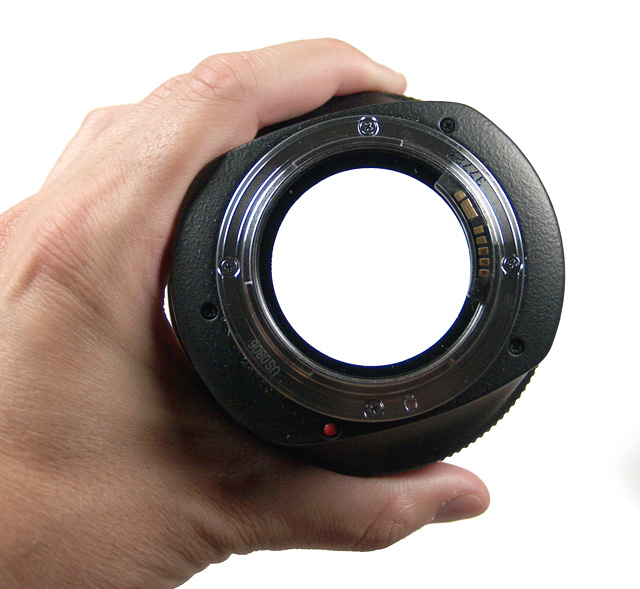|
Canon EF 85mm f/1.2 USM L II - APS-C Lab Test / Review |
|
Lens Reviews -
Canon EOS (APS-C)
|
|
Page 1 of 2

Review by Klaus Schroiff, published March 2010
Special thanks to Ron Merchant for providing this lens!
Introduction
The Canon EF 85mm f/1.2 USM L II is a lens where Canon "shows off" - it's the fastest, mass production
85mm SLR lens ever produced and a marvel within the lens lineup. It far from being a small and cheap
item but you're getting quite some glass for your bucks here. Starters may have a look at the back view here ...
 If you ever wondered when to use extreme shutter speeds this question will not arise when using such a lens.
In bright sunlight it is often not possible to use the f/1.2 setting because you'll hit the 1/8000s (or so)
barrier of your camera. So if you intend to use this lens at max. aperture in daylight conditions you should
also consider to invest into a gray filter to tame the amount of light. However, consequently the lens is
also great for available light photography.
If you ever wondered when to use extreme shutter speeds this question will not arise when using such a lens.
In bright sunlight it is often not possible to use the f/1.2 setting because you'll hit the 1/8000s (or so)
barrier of your camera. So if you intend to use this lens at max. aperture in daylight conditions you should
also consider to invest into a gray filter to tame the amount of light. However, consequently the lens is
also great for available light photography.

The mk II retains the optical design of its predecessor but the AF speed has been roughly doubled (1.8x) by using
a new CPU and improved AF algorithms. The quality of the construction is very high thanks to premium materials
but you expect no less than that from a lens in this price class. The undamped, rubberized focus ring turns a
bit too freely maybe.
 The lens features a ring-type USM AF drive with a front group linear extension system. In practical terms:
the length of the lenses changes slightly during focusing. The AF speed is pretty high now and certainly
an improvement over the old model - the EF 85mm f/1.8 USM is still a tad faster though.
A specialty of this lens is the manual focusing by wire. The focus gear isn't directly coupled
to the focus ring - all the action is done by the USM drive here. Some users aren't overly fond of this
approach but once you got used to the philosophy it's not all that strange anymore.
The focus path is comparatively long so accurate manual focusing is possible and that's despite the
ultra large aperture (that assumes a split-image focusing screen of course - otherwise you'd have a
hard time at f/1.2). Full time manual focusing is possible.
The lens features a ring-type USM AF drive with a front group linear extension system. In practical terms:
the length of the lenses changes slightly during focusing. The AF speed is pretty high now and certainly
an improvement over the old model - the EF 85mm f/1.8 USM is still a tad faster though.
A specialty of this lens is the manual focusing by wire. The focus gear isn't directly coupled
to the focus ring - all the action is done by the USM drive here. Some users aren't overly fond of this
approach but once you got used to the philosophy it's not all that strange anymore.
The focus path is comparatively long so accurate manual focusing is possible and that's despite the
ultra large aperture (that assumes a split-image focusing screen of course - otherwise you'd have a
hard time at f/1.2). Full time manual focusing is possible.
| Specifications |
|---|
| Equiv. focal length | 136 mm (full format equivalent) |
| Equiv. aperture | f/1.9 (full format equivalent, in terms of depth-of-field) |
| Optical construction | 8 elements in 7 groups inc. 1x aspherical and 2x high refraction elements, floating system |
| Number of aperture blades | 8 (circular) |
| min. focus distance | 0.95 m (max. magnification ratio ~1:9) |
| Dimensions | 91 x 84 mm |
| Weight | 1025 g |
| Filter size | 72 mm (non-rotating) |
| Hood | supplied, clip-on, barrel-shaped |
| Other features | - |
|